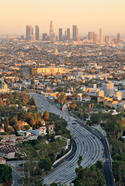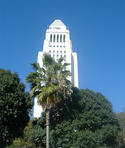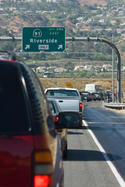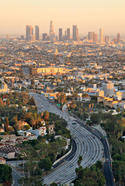There was a time when downtown Los Angeles was the commercial center of Southern California. According to Robert Fogelson, writing in his classic Downtown: Its Rise and Fall (1880-1950)"nearly half" of Los Angeles residents went downtown every day in the middle 1920s. A time traveler from 1925 might think that to still be the case, with the concentration of tall buildings, and the frequent press reports about downtown’s resurgence. read more »
Los Angeles
City of Villages
Los Angeles is unique among the big, world-class American cities. Unlike New York, Boston, or Chicago, L.A. lacks a clearly defined core. It is instead a sprawling region made up of numerous poly-ethnic neighborhoods, few exhibiting the style and grace of a Paris arrondissement, Greenwich Village, or southwest London. In the 1920s, the region’s huge dispersion was contemptuously described—in a quotation alternately attributed to Dorothy Parker, Aldous Huxley, or H. L. Mencken—as “72 suburbs in search of a city.” Los Angeles’s lack of urbane charm led William Faulkner to dub it “the plastic asshole of the world.” But to those of us who inhabit this expansive and varied place, the lack of conventional urbanity is exactly what makes Los Angeles so interesting. read more »
- Login to post comments
East of Egan: Success in California is Not Evenly Distributed
The New York Times ran a Timothy Egan editorial on California on March 6. The essay entitled Jerry Brown's Revenge was reverential towards our venerable Governor. It did, however, fall short of declaring Brown a miracle worker, as the Rolling Stone did last August. These and other articles are part of an adoring press's celebratory spasm occasioned by the facts that California has a budget surplus and has had a run of strong job growth. read more »
- Login to post comments
Possible Sign of Trouble for Los Angeles
A quarter century ago, the Los Angeles-Orange County area seemed on the verge of joining the first tier of global cities. As late as 2009, the veteran journalist James Flanigan could pen a quasiserious book, “Smile Southern California: You're the Center of the Universe,” which maintained that L.A.'s port, diversity and creativity made it the natural center of the 21st century. read more »
- Login to post comments
Build It, Even Though They Won't Come
The recent decision by Los Angeles County Superior Court Judge Allan J. Goodman to reject as “fatally flawed” the densification plans for downtown Hollywood could shake the foundations of California's “smart growth” planning clerisy. By dismissing Los Angeles' Hollywood plan, the judge also assaulted the logic behind plans throughout the region to construct substantial high-rise development in “transit-oriented developments” adjacent to rail stations. read more »
Public Engagement Miracle on 24th Street
Confrontation and conflict are the favorite dispute resolution tools of Baby Boomers, who were born in the aftermath of WWII and grew up in the rebellious ‘60s. In stark contrast, members of the Millennial generation, born 1982-2003, bring a spirit of collaboration and consensus to solving any problem they encounter. read more »
The Law's No Ass: Rejecting Hollywood Densification
The city of Los Angeles received a stunning rebuke, when California Superior Court Judge Alan J. Goodman invalidated the Hollywood Community Plan. The Hollywood district, well known for its entertainment focus, contains approximately 5% of the city of Los Angeles’ population. The Hollywood Plan was the basis of the city's vision for a far more dense Hollywood, with substantial high rise development in "transit oriented developments" adjacent to transit rail stations (Note 1). read more »
The Blue-Collar Heroes of the Inland Empire
The late comedian Rodney Dangerfield (nee Jacob Cohen), whose signature complaint was that he “can't get no respect,” would have fit right in, in the Inland Empire. The vast expanse east of greater Los Angeles has long been castigated as a sprawling, environmental trash heap by planners and pundits, and its largely blue-collar denizens denigrated by some coast-dwellers, including in Orange County, who fret about “909s” – a reference to the IE's area code – crowding their beaches. read more »
- Login to post comments
High Speed Rail Decision: Victory for Rule of Law
California Judge Michael Kenny has barred state bond funding for the California high speed rail system, finding that “the state's High-Speed Rail Authority failed to follow voter-approved requirements designed to prevent reckless spending on the $68 billion project.” These protections had been an important in securing voter approval of a $10 billion bond issue in 2008. Sacramento Bee columnist Dan Walters suggested that without the protections in Proposition 1A, the measure “probably would have failed” to obtain voter approval. read more »
- Login to post comments
Los Angeles: Will The City Of The Future Make It There?
When I arrived in Los Angeles almost 40 years ago, there was a palpable sense that here, for better or worse, lay the future of America, and even the world. Los Angeles dominated so many areas — film, international trade, fashion, manufacturing, aerospace — that its ascendency seemed assured. Even in terms of the urban form, L.A.’s car-dominated, multipolar configuration was being imitated almost everywhere; it was becoming, as one writer noted, “the original in the Xerox” machine. read more »





















